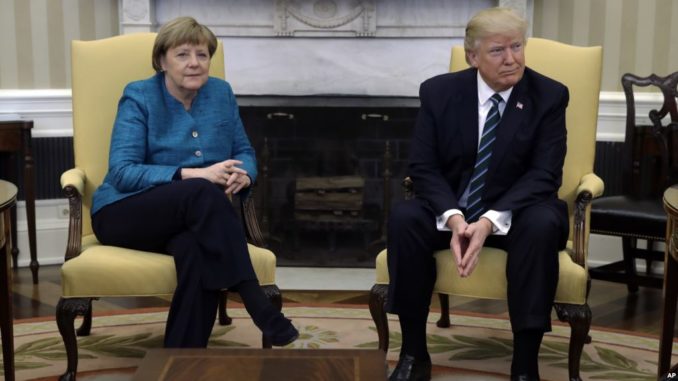
U.S. President Donald Trump and German Chancellor Angela Merkel will try to narrow differences over NATO, global trade and other issues at a White House meeting Friday, months after Trump accused Merkel of “ruining” Germany by admitting thousands of Syrian refugees.
It is the first in-person meeting between the leaders of the Western world’s most influential countries since Trump’s unexpected win in November’s presidential election.
They seemed to be on a collision course since candidate Trump accused Merkel of “ruining Europe” with liberal immigration policies, spoke ill of NATO, and hinted at a trade war.
FILE – In this Sept. 4, 2015 file photo a migrant holds up a poster of German Chancellor Angela Merkel before starting a march out of Budapest, Hungary, towards Austria.
At odds over travel ban
Merkel, for her part, scolded Trump for imposing a travel ban on immigrants from six mostly Muslim countries, and reminded him that any close U.S.-Germany cooperation must be based on “values of democracy, freedom, respect for the rule of law and human dignity, regardless of origin, skin color, religion, gender, sexual orientation or political belief.”
Several contentious issues await the two leaders; but, on many key issues, from NATO to the European Union, experts say the seeds of cooperation have already been sown.
Daniel Hamilton, director of the Center for Transatlantic Relations at the Johns Hopkins University School of Advanced International Studies, says it’s important to note that while Trump often says one thing, his administration actually is doing something else.
“When it comes to official statements, his vice president [Mike Pence] went to Germany and Brussels and said reassuring things about NATO. Secretary [of Defense Jim] Mattis echoed all that. Those have all been mainstream traditional U.S. foreign policy statements about the alliance,” he said.
Hamilton notes that Merkel’s Germany and other NATO allies have responded positively to Trump’s call for Europe to assume a greater share of the collective defense burden.
German Chancellor Angela Merkel, right, speaks with European Council President Donald Tusk, left, and Lithuanian President Dalia Grybauskaite, center, during a round table meeting at an EU summit in Brussels on March 10, 2017.
Trade deals
Still, Hamilton warns of “troubled waters” on the economic front of the U.S.-EU relationship. Trump’s stated preference for bilateral pacts with trading partners flies in the face of the European Union’s position that it is the sole representative of its 28 member countries.
As a candidate, Trump suggested he would renounce multilateral deals such as the Transatlantic Trade and Investment Partnership (T-TIP) with Europe, which had been championed by Merkel and former U.S. President Barack Obama.
In a hint at a possible compromise, a senior administration official told reporters last week that T-TIP could be considered a one-on-one trade deal, given how the EU structure interconnects European economies.
Border tax
The leaders are expected to also discuss another controversial issue, Trump’s proposed border tax, which is meant to encourage companies to make goods in the United States. Just hours before the Oval Office meeting, Germany’s economy minister threatened to file suit against the U.S. at the World Trade Organization in an attempt to block the tax.
Trump sees the tax as boosting his job creation agenda. Europeans see it as a challenge to the global trading system at a time when Trump’s policies are pushing the United States toward protectionism.
“The Germans are worried,” said Stephen Szabo, executive director of the Transatlantic Academy and a fellow at the German Marshall Fund of the United States. “Trump’s trade negotiator [Peter] Navarro has been singling out Germany as the biggest U.S. trade problem, bigger even than China.” Navarro heads the newly-formed White House National Trade Council.
Szabo says Merkel will make the point that “German firms are big investors in the U.S., creating more than 600,000 American jobs in American-German companies. So she’s going to explain that ‘if you go after us, you’re going to be hurting jobs in the U.S.”
SAIS’s Daniel Hamilton says Merkel will try to use her considerable negotiating skills to provide a fuller understanding of European perspectives to a president famous for his book, “The Art of the Deal.” “Her style is not to confront; she’s very pragmatic, she downplays the drama,” he told VOA. “She’ll …help the president understand some of the dynamics affecting Europe and Germany’s role.”
Prelude to G7
Hamilton sees the White House meetings as a prelude to future negotiations when Trump makes his first presidential visit to Europe in May to attend both a NATO summit in Brussels followed by a G7 summit in Sicily. “That will be the next big step,” he said.
Other political analysts say Trump will likely seek advice from Merkel on how best to deal with Russian President Vladimir Putin. Merkel has dealt with the controversial Russian leader extensively, while Trump has praised him – much to the consternation of Republican and Democratic lawmakers in the U.S.
Merkel and Trump were originally scheduled to meet earlier this week, but a snowstorm on the U.S. east coast prompted the two world leaders to delay it.
White House correspondent Pete Heinlein contributed to this report
VOA